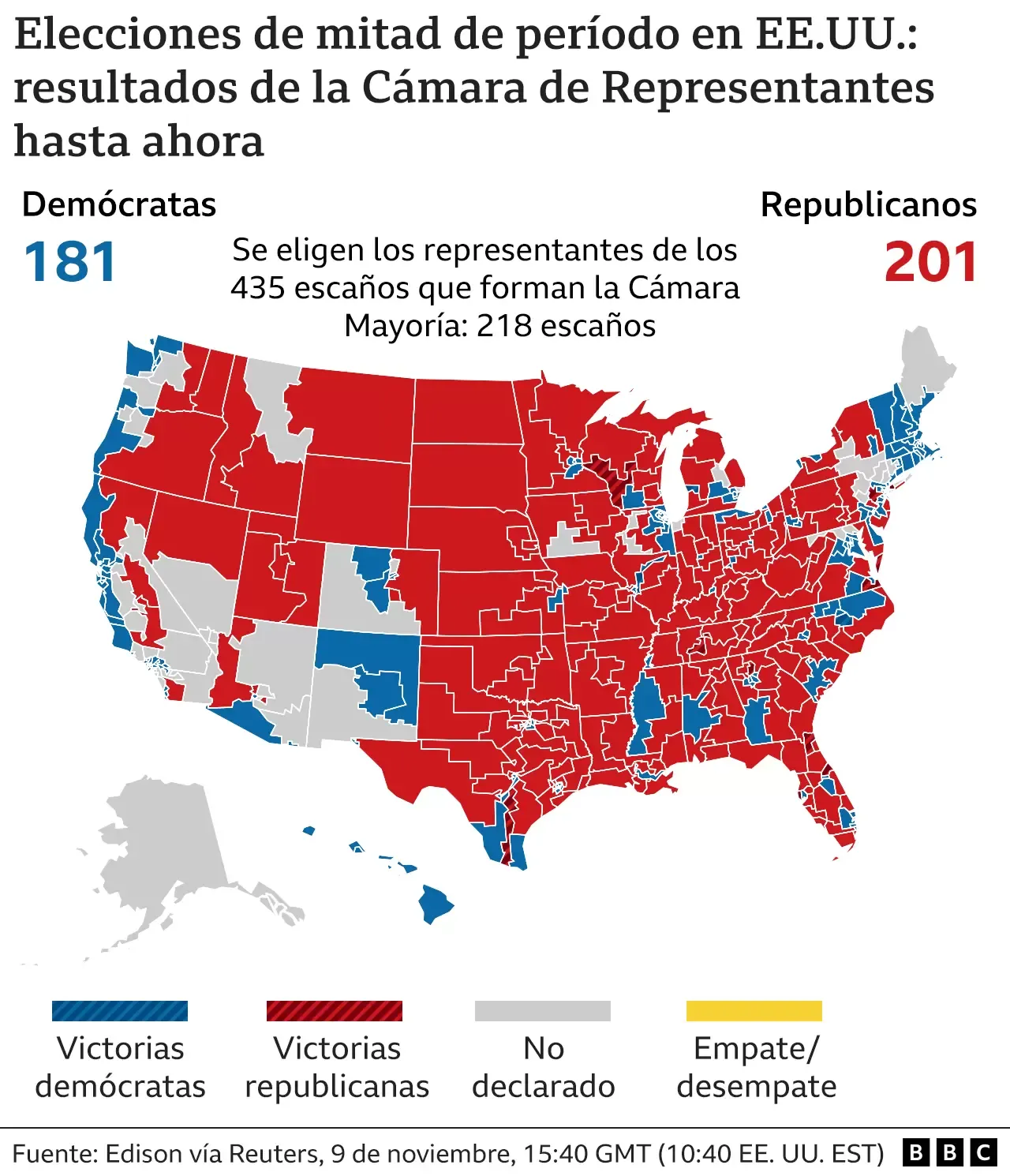The Republicans seem headed to recover the House of Representatives, but the definitive control of Congress is still uncertain and will depend on three battles with still uncertain results.
In the absence of many official results after the elections on Tuesday, the Republican Party would regain control of the House of Representatives, according to projections, but so far the numbers rule out a “red wave” and show a tough resistance from the Democrats in key fights. .
LOOK: The first congressman of generation Z, the first lesbian governor and other historical milestones of the elections in the USA.
According to the US network CBS, a BBC partner, the Republicans are emerging as a majority in the lower house of Congress. They only need to win five seats that are now in Democratic hands to regain control.
But the math is more complex for the Senate, which is renewing a third of its members with some races too close to anticipate who wins.
One of the three decisive races, in the state of Georgia, could be defined in another election on December 6, the date until which we would have to wait to see which party definitively controls the Senate.
The 3 decisive races for control of the Senate
In the upper house there is currently a 50-50 tie that is broken by the vice president Kamala Harris, who has the right to vote in the upper house when this situation arises. Therefore, any change can unbalance the balance.
Democrats are breathing a sigh of relief, as they might consider keeping control of the Senate a great outcome. For example, John Fetterman he won in his dispute for the state of Pennsylvania, which is an important victory by recovering a position that was in Republican hands.
“Although a single result does not mark an election, Pennsylvania raises the spirits of the Democrats considerably,” said John Sudworth, correspondent for the BBC in the United States, after knowing the result.
“It’s definitely not a red wave, that’s for sure,” the Republican senator admitted on television. Lindsay Graham.

___________________________________
Republicans don’t run over Democrats
Analysis by Anthony Zurcher, BBC correspondent in the USA.
At least for now in the 2022 midterms, Republicans are doing well enough but not great.
In gubernatorial races, high-profile Republicans have won Florida, Texas and Georgia, but two other state governments have gone to Democrats.
Republicans only had to flip five seats in the House of Representatives to have a majority, and they appear on track to do just that.
But they’re not winning every tight contest and they’re not getting any resounding, surprising wins.
In the Senate the results are even more uncertain. The Republicans have won states where they had an advantage, but the Democrats have prevailed in the states they had planned and, in addition, they have won a crucial seat in Pennsylvania.
The outcome of the races that are yet to be decided -Georgia, Nevada and Arizona- will largely determine the final perception of these elections.

___________________________________
A referendum on Biden
Both chambers of Congress have been under Democratic control in the first two years of the president’s term. Joe Biden.
If there is finally a change in partisan control, that would affect Biden’s agenda, which could see his initiatives blocked.
Normally, mid-term elections are a referendum on the president’s management and are usually negative for the party that controls the White House.
Biden has low approval levels (around 45%) and high inflation, the highest in the last 40 years and therefore the big issue for many Republican voters, plays against the party in government.
But early exit polls also showed that abortion was the most important issue for 3 in 10 voters. This could have benefited the Democrats, after the decision of the US Supreme Court of Justice -with a conservative majority- to eliminate the constitutional right to the interruption of pregnancy throughout the country.
In the White House there is an atmosphere of “emotion and validation” with the results, according to the CBS network.
The final results will take time to be known because there are parts of the country where the vote count continues and in several states it can take days, especially for the most even disputes.
______________________________
what do we know so far
What we don’t know yet
______________________________
Even a slim Republican majority in Congress closes the door on Biden initiatives
Analysis by Anthony Zurcher, BBC correspondent in the USA.
It seems likely that the Republicans, as widely predicted, will take control of the House of Representatives when the new Congress begins early next year.
If so, the question is how big a majority they could have.
Almost like a big storm, a true electoral wave can dislodge some politicians who were supposed to keep their seats. It is time to expect surprises.
But even if Republicans end up with only a slim majority in the House, the door will be closed on Joe Biden’s legislative agenda for the next two years. This will generate a level of intense congressional oversight that the president has so far avoided.

_______________________________
What would it mean if there is a divided government?
A divided government refers to a situation where one or both houses of the US Congress are controlled by a party that opposes the incumbent president, something that looks like it could happen as of this election.
This type of government has been common in the North American country since the 1970s. The most recent was during the last two years of Donald Trump’s presidency, when the Democrats controlled the House.
Some people support divided government because it means that each political party can keep an eye on the other, for example by checking unwelcome spending measures or blocking certain projects from becoming law.
Additionally, divided chambers can force lawmakers to write laws that have a broader base of support, making them harder to undo when power changes hands. In this situation, cooperation generates political stability.
But when parties are polarized in their positions, a divided government can make it impossible for one party to pass legislation, leading to gridlock.

Source: Elcomercio
I, Ronald Payne, am a journalist and author who dedicated his life to telling the stories that need to be said. I have over 7 years of experience as a reporter and editor, covering everything from politics to business to crime.

:quality(75)/cloudfront-us-east-1.images.arcpublishing.com/elcomercio/VS7ANALN5FG4DMX3OHYAQ7YW7Y.webp)


:quality(75)/cloudfront-us-east-1.images.arcpublishing.com/elcomercio/TU2APYGAYJDXLOVPM2RQZPGOBI.jpg)


